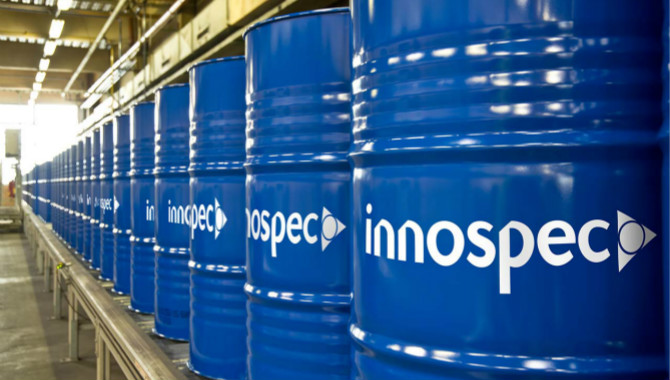
Colorado-based global specialty chemicals company Innospec on Tuesday (3 September) launched a new series of additives specifically developed for new blends of 0.5% sulphur limit IMO 2020 bunker fuels at the 9th Biennial Bunkering in Asia conference.
The two new multi-functional additives, Octamar™ HF-10 Plus and Octamar™ Ultra HF, both enhance the stability and compatibility of VLSFOs and hybrid fuels; however, Octamar™ Ultra HF offers extra combustion improvements to aid blends with ignition issues.
“Additive solutions for marine fuels were simply a ‘good to have’ in the past, but now with IMO 2020 around the corner we are seeing so many people open to this cost effective measure for marine fuel risk management,” Martin Chew, Marine Regional Sales Manager, Asia Pacific, told Manifold Times.
“There is no straight forward solution for the changeover of IMO 2020 compliant fuels and a chemical [additive] solution is one of the ways vessels can transit from consuming HSFO to VLSFO in a safe and predictable manner.”
According to Chew, most ship owners are aware they are not recommended to mix the new blends of IMO 2020 compliant fuels due to potential issues.
“Segregation in storage tanks is possible on larger ships with many tanks. That said, in some cases this might reduce the range of the ship. Older ships with 1 set of settling and service tanks will certainly experience co-mingling at some point of time.”, he explains.
“Properties of these new fuels (e.g. viscosity, cold flow properties, CCAI and cat fines) are too varied and everyone knows of their possible stability and compatibility issues which can actually worsen under operating conditions.”
“In the end, co-mingling cannot be avoided especially when you get another new batch of compliant fuel to go on top of an initially compliant fuel - that is where the problem comes in.”
Chew notes of field reports indicating sludging issues faced by ship owners when less than 10% of different IMO 2020 compliant marine fuel blends are mixed together.
“The reason for the large range of properties seen in IMO 2020 compliant fuels is due to refiners, who are more concerned about meeting ISO 8217 specifications, each having different blends.”, informs Lawrence Chia, VP Sales – Asia Pacific, Performance Specialities.
Innospec has been supplying additives to heavy fuel refining customers for the past 80 years.
“We are also working with a lot of refineries and we’re trying to help them to meet the specifications of IMO 2020 fuels; what we are seeing is that they are having problems with CFPP (cold filter plugging point), pour point, TSP (total sediment potential), and combustibility.” notes Chia.
“That’s why we are seeing compliant fuels produced by refiners having a wide range and much lower viscosity. As the refiners’ concern is limited to meeting the ISO 8217 specification, the potential operational issues are with the end user.”
“Our products [Octamar™ HF-10 Plus and Octamar™ Ultra HF] have gone through intensive R&D over the past one year where we collected close to 100 samples for testing at the refinery level.”
“We actually tested our additives on IMO 2020 compliant marine fuels and can verify these products are able to stabilise the fuels and greatly reduce the chances of operational issues when the fuels are co-mingled.”
Source:Manifold Times
The opinions expressed herein are the author's and not necessarily those of The Xinde Marine News.
Please Contact Us at:
admin@xindemarine.com


 Ningbo Containerized Freight Index Weekly Commentar
Ningbo Containerized Freight Index Weekly Commentar  Ningbo Containerized Freight Index Weekly Commentar
Ningbo Containerized Freight Index Weekly Commentar  Ningbo Containerized Freight Index Weekly Commentar
Ningbo Containerized Freight Index Weekly Commentar  BIMCO Shipping Number of the Week: Bulker newbuildi
BIMCO Shipping Number of the Week: Bulker newbuildi  Ningbo Containerized Freight Index Weekly Commentar
Ningbo Containerized Freight Index Weekly Commentar  Ningbo Containerized Freight Index Weekly Commentar
Ningbo Containerized Freight Index Weekly Commentar